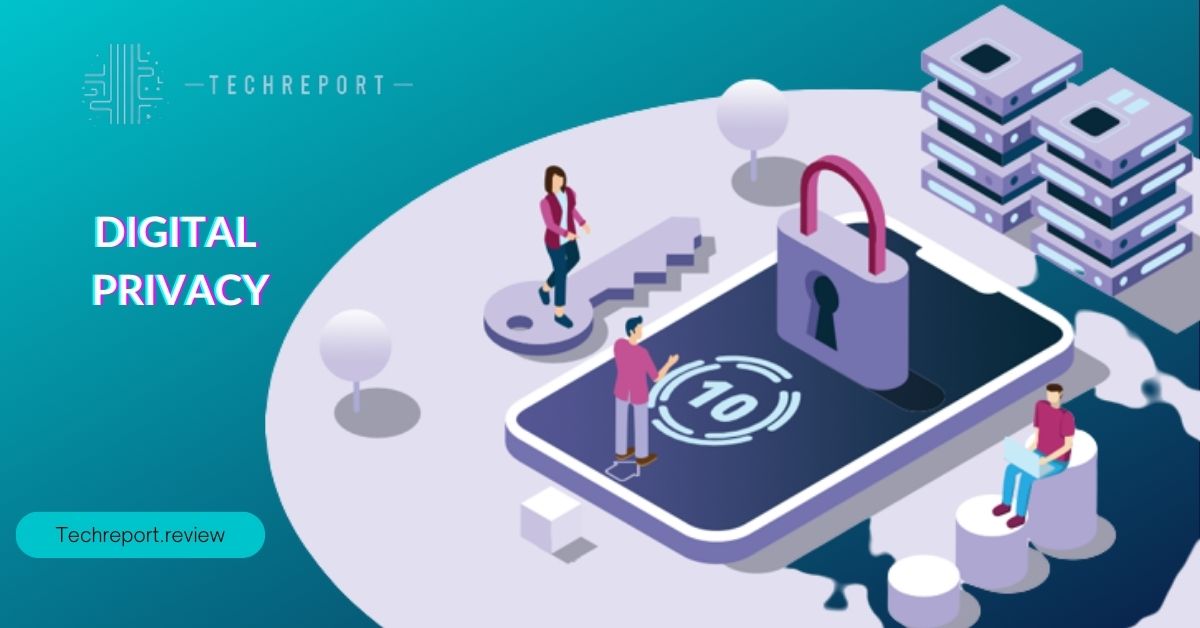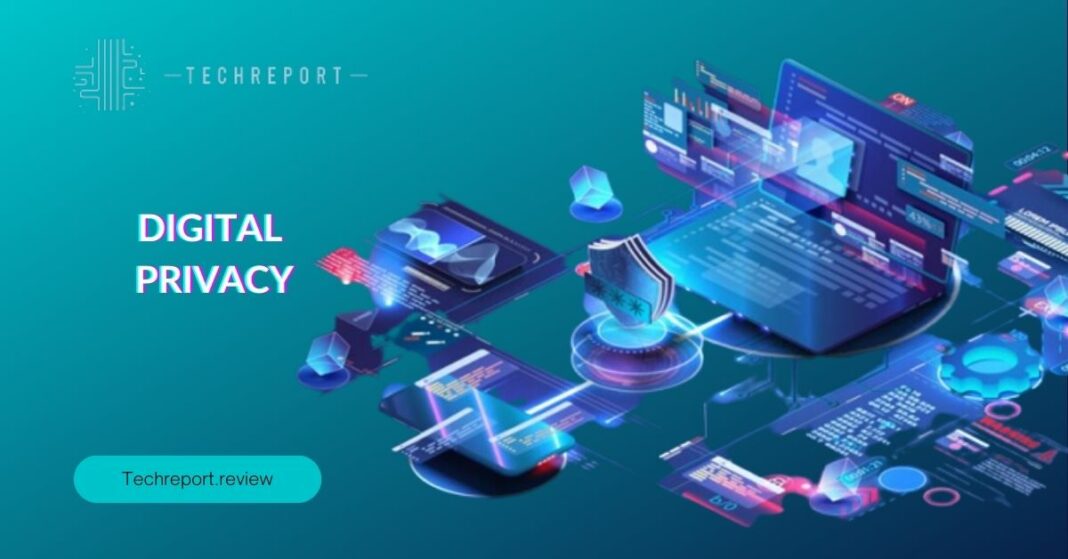In an era defined by the rapid digitization of our lives, the concept of personal data has taken center stage, bringing with it a pressing concern—digital privacy. As we traverse the digital landscape, our actions, preferences, and even the most seemingly trivial interactions leave behind trails of data. This data, often referred to as our “digital footprint,” holds a significant value, both to us as individuals and to the entities that seek to harness its potential. In this age of interconnectedness and information exchange, the boundaries between the online and offline worlds have blurred, emphasizing the paramount importance of safeguarding our personal data.
Digital privacy, once a concern reserved for tech-savvy individuals or cybersecurity professionals, has now evolved into a critical concern for people from all walks of life. As technology continues to weave itself into the fabric of our daily routines—tracking our locations, analyzing our preferences, and shaping our online experiences—it has become clear that our personal data is at the heart of this transformation.
We live in an age where data drives decisions, and every online action contributes to the digital mosaic that outlines our personalities, habits, and desires. Advertisers, corporations, and even malicious actors recognize the potential that lies within this wealth of data. From targeted advertising that caters to our specific interests to more nefarious activities such as identity theft or financial fraud, the stakes are high when it comes to protecting our personal information.
As we delve deeper into the world of interconnected devices, smart technologies, and the Internet of Things (IoT), the amount of data generated and shared is exponentially increasing. From smart thermostats that track our heating patterns to fitness trackers that monitor our every step, our lives are continuously digitized. This surge in data generation necessitates a renewed emphasis on digital privacy, as our personal information becomes more valuable than ever before.
In this age of data-driven decision-making, digital privacy isn’t merely a concern—it’s a fundamental right that we must actively safeguard. The ubiquity of data breaches, cyberattacks, and privacy infringements serves as a stark reminder that the digital realm is not exempt from risks. Thus, understanding the importance of personal data and its connection to digital privacy is not just an option; it’s imperative for anyone navigating the modern digital landscape.
In the subsequent sections of this blog, we will delve deeper into the significance of personal data, exploring its various dimensions and shedding light on why its protection should be a shared responsibility. Through the lens of potential data breaches and unauthorized use of personal information, we will uncover the tangible consequences that can arise from a lack of vigilance in the realm of digital privacy. So, join us as we unravel the layers of our digital identities and uncover the inherent value of safeguarding our personal data in an age where data is both a treasure trove and a potential liability.
If you value your online privacy and data security, Incogni is your trusted ally. Incogni empowers users to exercise their right to privacy by helping them reclaim control over their personal information. In an age where data protection is paramount, Incogni offers a subscription-based service that makes it easier than ever to remove your data from the clutches of data brokers. Your privacy matters and Incogni is here to ensure it remains in your hands.
The Significance of Personal Data

In the intricate web of modern technology and interconnectedness, personal data serves as the virtual threads that connect our digital lives. It encompasses a broad spectrum of information, both sensitive and seemingly mundane, that collectively forms a mosaic of our identities in the digital realm. From our browsing history and social media interactions to our shopping preferences and health data, personal data casts a wide net, capturing the nuances of our behavior and interests.
Personal data is an all-encompassing term that spans various categories, each shedding light on different facets of our lives. It includes the basics like our names, addresses, and contact details, which are the building blocks of our online identities. However, personal data extends beyond the surface level to encompass more intimate aspects such as our political affiliations, religious beliefs, health information, and even our online friendships.
The value of personal data to companies, advertisers, and data brokers lies in its utility. Every click, like, and search query paints a picture of our preferences, enabling organizations to tailor their offerings to suit our tastes. Companies leverage this data to refine their marketing strategies, creating personalized advertisements that resonate with our desires. Advertisers, armed with insights derived from personal data, can target us with astonishing precision, promising products and services that cater to our individual needs.
Data brokers, often operating behind the scenes, play a pivotal role in the personal data ecosystem. These entities collect, aggregate, and trade personal data, creating a marketplace where our digital footprints are bought and sold. Data brokers amass information from various sources, including social media, online transactions, and public records, weaving together intricate profiles that reflect our behaviors, preferences, and habits.
In today’s digital landscape, personal data has transformed into a commodity of immense value. It’s the currency that powers the engine of targeted advertising, helping companies drive sales and build customer loyalty. Moreover, personal data plays a role in refining products and services to better suit the needs of consumers. This symbiotic relationship between data and industry has reshaped the way businesses operate, emphasizing the central role of personal data in modern commerce.
Yet, as personal data’s value increases, so does the need to protect it. The vulnerabilities inherent in the digital age—data breaches, identity theft, and invasive surveillance—underscore the importance of treating personal data as a valuable asset that requires vigilant safeguarding. In a world where data is as influential as currency, understanding the multifaceted significance of personal data is the first step towards ensuring that its value remains in the hands of those to whom it truly belongs: the individuals generating it.
Potential Consequences of Data Breaches
In the digital age, where information flows freely and transactions occur at the speed of light, the specter of a data breach looms large. A data breach occurs when unauthorized individuals gain access to sensitive or confidential information stored in digital repositories. This breach of security can transpire due to various reasons, ranging from cyberattacks to inadvertent mishandling of data. The repercussions of such breaches are not confined to the digital realm; they reverberate through the lives of individuals, institutions, and societies.
A data breach can occur through various means, including hacking, phishing attacks, malware infections, and insider threats. Cybercriminals exploit vulnerabilities in software, networks, or human behavior to gain unauthorized access to databases containing personal and sensitive information. Once a breach occurs, the compromised data—ranging from login credentials and financial information to health records and personally identifiable information—can be exposed, stolen, or sold on the dark web.
The immediate consequences of a data breach are often anxiety-inducing. For individuals, the realization that their private information is now in the hands of malicious actors can trigger feelings of violation and insecurity. Financial fraud, unauthorized account access, and identity theft are just a few of the potential repercussions. Beyond the initial shock, the long-term consequences can be even more insidious.
In the aftermath of a data breach, victims may spend years trying to restore their compromised identities. Financial losses, including drained bank accounts and unauthorized credit card charges, can lead to lasting financial distress. Additionally, cybercriminals can exploit personal information for social engineering attacks, targeting victims with phishing emails or scams tailored to their individual details. The emotional toll of having one’s personal information exposed can lead to increased stress, anxiety, and a loss of trust in digital services.
Real-world examples of major data breaches underscore the far-reaching impact they can have. The Equifax breach of 2017 exposed the sensitive financial information of nearly 143 million Americans, leading to financial losses and a widespread erosion of trust. The breach of social media giant Facebook, affecting over 50 million users in 2018, highlighted the potential for unauthorized access to personal interactions and preferences. These breaches not only disrupt lives on an individual level but also shake the foundation of societal trust in digital platforms.
The potential consequences of data breaches go beyond the realm of digital security. They transcend the confines of passwords and encryption, penetrating the very fabric of our lives. In a world where our most intimate details are digitized and stored, safeguarding personal information becomes an imperative, one that involves not only individuals but also the companies entrusted with our data. Understanding the gravity of data breaches and their multifaceted impact is the first step towards adopting a proactive stance in the protection of our digital identities.
Unauthorized Use of Personal Information
In the interconnected world of data exchange and digital interactions, the unauthorized use of personal information has emerged as a formidable concern, casting a shadow over the promise of convenience and connectivity. The digital realm, while brimming with opportunities, also offers a fertile ground for malicious actors seeking to exploit personal data without consent. This unauthorized use takes on various forms, each presenting its own set of risks and challenges.
The unauthorized use of personal data takes advantage of the troves of information that individuals generate as they navigate the digital landscape. This information, which ranges from email addresses and phone numbers to credit card details and passwords, can be manipulated by cybercriminals for their own gain. The avenues through which data can be exploited are diverse, and the repercussions can be both immediate and long-lasting.
One of the most nefarious consequences of unauthorized data use is identity theft. Cybercriminals can piece together stolen personal information to create a digital replica of an individual’s identity. This can lead to a cascade of devastating consequences, including financial ruin, damaged credit scores, and a prolonged battle to reclaim one’s stolen identity. The aftermath of identity theft is not confined to the digital sphere; it extends to the physical world, affecting an individual’s reputation and well-being.
Another insidious technique that exploits personal data without consent is phishing. Cybercriminals craft convincing messages, often impersonating trusted entities, to deceive individuals into revealing sensitive information or downloading malware. Phishing attacks prey on psychological vulnerabilities, such as fear or curiosity, and leverage personal data to create seemingly authentic scenarios. Once successful, these attacks can lead to financial losses, data breaches, and compromised accounts.
The unauthorized use of personal data extends beyond cybercrime; it infiltrates the very fabric of our online lives. Our digital identities are molded by the information we share—our interests, affiliations, and preferences. This data can be weaponized to manipulate decisions, shape opinions, and influence behaviors. The repercussions of such manipulation are not limited to individuals; they extend to society, impacting political landscapes and social dynamics.
The need to protect personal information has never been more urgent. As technology advances, so do the tactics of malicious actors seeking to exploit vulnerabilities. The first line of defense lies in digital hygiene—practices like strong, unique passwords, two-factor authentication, and caution against sharing sensitive information online. Employing security measures is not a luxury but a necessity, as it acts as a shield against the potential consequences of unauthorized data use.
In an age where personal information is both a digital asset and a potential liability, understanding the risks of unauthorized data use is paramount. The tales of identity theft, phishing attacks, and manipulated digital identities serve as cautionary tales that underscore the need for vigilance. As we navigate the digital realm, protecting personal information becomes an act of self-preservation, safeguarding not only our financial well-being but also the integrity of our digital identities.
The Impact on Privacy and Autonomy
In the digital age, where every click, search, and interaction leaves behind a trail of data, the erosion of personal privacy has become an undeniable reality. Our lives, once shielded by the physical boundaries of our homes and communities, now extend into the virtual realm where personal data is collected, analyzed, and monetized. This unchecked data collection poses a threat not only to our privacy but also to our fundamental autonomy and freedom.
The traditional notion of privacy, once defined by the physical spaces we inhabit, has undergone a paradigm shift. In the digital realm, personal privacy is no longer confined to the four walls of our homes; it extends to our online interactions, searches, and preferences. Yet, as technology advances and data collection becomes more pervasive, the walls of this digital sanctuary are showing signs of cracking.
Excessive data collection has emerged as a double-edged sword in the digital age. On one hand, it fuels personalized experiences and services, offering convenience and tailored content. On the other, it encroaches upon our autonomy, presenting a paradox where our choices are influenced by algorithms and data analytics. The abundance of personal data allows companies to predict our preferences, behaviors, and even our future decisions—a practice that raises questions about the authenticity of our choices.
As data collection grows more sophisticated, it inadvertently poses a threat to individual freedom. The abundance of personal information allows entities to manipulate our digital experiences, presenting us with content that reinforces our existing beliefs and preferences. This echo chamber effect limits exposure to diverse viewpoints, constraining our ability to make informed decisions and engage in open dialogue.
Amid the complex landscape of data sharing and information exchange, maintaining control over personal information becomes a fundamental act of self-preservation. It’s not merely about protecting data points; it’s about safeguarding the autonomy to define our digital identities. By retaining control over our personal information, we reclaim agency over our online experiences, ensuring that our interactions are not dictated solely by data-driven algorithms.
The importance of informed consent cannot be overstated. Individuals have the right to choose what information they share, how it is used, and with whom it is shared. Equipped with transparency and control, users can engage with digital platforms while safeguarding their autonomy and privacy. This shift towards informed consent is not a rejection of technology but a recalibration of the power dynamics in the digital landscape.
In the journey towards preserving privacy and autonomy in the digital age, understanding the nuances of data collection and its implications is vital. The erosion of privacy isn’t an inevitability; it’s a consequence of unchecked data practices. By recognizing the importance of maintaining control over personal information, we pave the way for a digital future where our autonomy is respected, our choices remain authentic, and our interactions reflect the richness of diverse perspectives.
The Value of Personalization and Targeted Advertising
In the bustling digital landscape, where every online interaction leaves behind traces of data, personalization, and targeted advertising emerge as two sides of a complex coin. While concerns about data privacy and intrusive tracking abound, there is another perspective—one that emphasizes the benefits of personalization in enhancing user experiences and revolutionizing the way content and services are delivered.
Personalization transforms the digital experience from a one-size-fits-all approach to a tailored journey. It hinges on the premise that each individual is unique, with distinct preferences, interests, and needs. By harnessing the power of data, companies can curate content and services that resonate with users on a personal level. This transformation has redefined user engagement, making interactions more meaningful and relevant.
At the heart of personalization lies data—the fragments of information users generate while interacting with digital platforms. This data acts as the building blocks for personalized experiences. Algorithms analyze user behavior, preferences, and historical data to offer recommendations, content suggestions, and product offerings that align with individual tastes. This, in turn, saves users time and effort, leading to a more efficient and enjoyable online journey.
Targeted advertising, often an integral part of personalization, leverages user data to present advertisements that align with individual interests. Instead of bombarding users with irrelevant ads, this approach offers a streamlined advertising experience. Brands can communicate their messages more effectively while users are exposed to products and services that resonate with their needs.
However, the value of personalization is accompanied by an ethical conundrum. The fine line between useful personalization and intrusive data collection is a subject of ongoing debate. While personalization enhances user experience, it also raises concerns about privacy invasion and consent. The challenge lies in striking a balance—delivering tailored experiences without crossing boundaries that encroach upon user autonomy.
As digital platforms continue to evolve, the ethical imperative becomes more pronounced. It’s crucial for companies to adopt transparent data practices, obtain informed consent, and empower users with control over their personal information. Ethical personalization acknowledges that users should have the right to determine the extent to which their data shapes their digital experiences.
Personalization and targeted advertising have ushered in a new era of user-centric digital interactions. By recognizing the value of personal data in enhancing user experiences, companies are crafting online journeys that align with individual preferences. However, the evolution of personalization also underscores the need for ethical considerations. It’s a journey that involves not only utilizing data to create tailored experiences but also respecting user autonomy, privacy, and consent. Striking this balance is the key to unlocking the full potential of personalization in the digital age.
Balancing Convenience and Privacy
In the dynamic landscape of the digital world, a perennial dilemma emerges—a delicate balance between convenience and privacy. On one hand, the digital age offers a plethora of conveniences, from personalized recommendations to seamless transactions. On the other hand, these conveniences often come at the cost of sharing personal data, raising questions about the extent to which we are willing to trade privacy for ease of use.
Convenience, driven by data-driven technologies, has revolutionized the way we interact with the digital realm. From predictive text suggestions that speed up communication to smart home devices that anticipate our needs, these conveniences streamline daily life. Yet, beneath the surface lies a symbiotic relationship—the more data we share, the more refined these conveniences become.
At the heart of this dilemma lies the spectrum of data sharing—ranging from minimal to extensive. Some individuals willingly share personal information, recognizing that it enhances their online experiences. Others prioritize privacy, opting to limit data sharing to the bare essentials. Wherever one falls on this spectrum, the decision to share data is deeply personal and contingent upon factors such as values, risk perception, and desired outcomes.
As we navigate this landscape, it’s imperative to engage in conscious decision-making about data sharing. Convenience should not be pursued blindly; it should be accompanied by an understanding of the implications of sharing personal information. Encouraging readers to reflect on their comfort levels with data sharing is a step towards informed consent—one where individuals consciously choose the level of data exposure that aligns with their values and preferences.
Informed consent is the cornerstone of the convenience-privacy conundrum. When individuals are empowered with information about how their data is used, they can make decisions that are congruent with their aspirations for both convenience and privacy. Transparency from companies and digital platforms, paired with clear communication about data practices, allows users to make choices that align with their comfort zones.
Striking the balance between convenience and privacy is not an either-or proposition. It’s a nuanced journey that requires introspection, education, and engagement. It’s about leveraging the conveniences of the digital age while safeguarding personal boundaries. Recognizing that each individual’s balance point is unique is crucial—a balance that acknowledges that while convenience can enhance our lives, it should never come at the expense of our fundamental right to privacy.
In the grand interplay between convenience and privacy, individuals have agency. By considering the implications of data sharing and evaluating their comfort levels, readers can navigate the digital landscape with intention. The digital world offers a tapestry of experiences, and at its core lies the power of choice—the choice to embrace the conveniences of technology while maintaining a sense of control over personal data. It’s a journey that ultimately empowers individuals to harness the benefits of the digital age while preserving the sanctity of their privacy.
Empowerment Through Digital Privacy
In the rapidly evolving landscape of data-driven technologies, the concept of empowerment through digital privacy has emerged as a beacon of hope. As the intricacies of data collection and usage become more apparent, individuals are seeking ways to regain control over their personal information. This empowerment journey, often facilitated by services like Incogni, holds the potential to reshape the digital landscape and empower individuals to reclaim ownership of their data.
Services like Incogni stand as a bridge between individuals and the sprawling world of data brokers and advertisers. By advocating for users’ rights to privacy, these services work tirelessly to reclaim control over personal data. Incogni’s approach, rooted in the principles of transparency and informed consent, empowers users to dictate the fate of their personal information—whether it’s shared, stored, or removed from databases.
Taking steps to protect personal data is akin to arming oneself with knowledge and tools to navigate the digital realm effectively. Empowerment, in this context, stems from the act of understanding how personal data is collected, processed, and utilized. It’s about making conscious choices and reclaiming the driver’s seat in the narrative of data sharing. By choosing to safeguard personal information, individuals pave the way for a digital experience that aligns with their values and preferences.
Fundamentally, the concept of digital empowerment rests upon the principle that individuals have the inherent right to determine the fate of their personal data. Just as one can decide who enters their physical space, the digital realm should adhere to the same principles of consent and agency. Individuals have the right to decide how their data is used, whether it’s for personalized services or targeted advertising. This power to determine the destiny of one’s data is a quintessential facet of digital empowerment.
Embracing the ethos of digital empowerment is not just a personal choice; it’s an assertion of digital citizenship. It’s a declaration that individuals deserve to participate in the digital landscape on their own terms. This paradigm shift from passive data generators to active data stewards signifies a turning point in the narrative of data privacy—one where individuals actively contribute to the dialogue about the value and sanctity of personal data.
Empowerment through digital privacy is a transformative concept that transcends the realm of data protection. It’s a movement that empowers individuals to reclaim control, shape their digital experiences, and exercise their right to privacy. As services like Incogni pave the way for a more transparent and user-centric data ecosystem, individuals have the opportunity to champion their own digital destinies. It’s a journey that bridges the gap between technology and agency, creating a digital world where privacy and empowerment coexist harmoniously.
In Crux
In the intricate dance of data exchange and digital interactions, the facets of personal data and digital privacy have been illuminated from various angles. As we conclude this exploration, it’s essential to reflect on the key points that have underscored the intricate relationship between data, privacy, and empowerment.
Personal data, once confined to the realms of identity and preferences, has evolved into a tapestry woven from our digital footprints. From the basics of contact details to the intricacies of online behavior, every interaction contributes to this mosaic. This data has a value that goes beyond mere information—it powers the algorithms that create personalized experiences and targeted content.
The discourse around data privacy has showcased its dual nature—an interplay between convenience and privacy, personalization and intrusion. On one hand, the conveniences of tailored experiences enhance our digital lives. On the other hand, unchecked data collection threatens our autonomy, subjecting us to the influence of algorithms that predict our decisions. Striking a balance between these two facets is a journey that requires conscious decision-making.
Amid the complexities, the concept of empowerment through digital privacy has shone as a guiding light. Services like Incogni exemplify the power of informed consent, enabling individuals to regain control over their personal data. This journey towards empowerment is a proactive stance, one that transcends the role of data generators to become data stewards. It’s a declaration that personal data is not just a commodity—it’s a reflection of individual identities and choices.
As the digital landscape continues to evolve, the importance of preserving digital privacy becomes more pronounced. Every step we take to safeguard personal data echoes through time, creating a legacy of digital stewardship. Embracing this responsibility empowers us to contribute to a digital world that respects individual rights, values, and autonomy.
As we bid adieu to this exploration, we extend an invitation—an invitation to take proactive steps to safeguard your personal information. By making informed choices, being vigilant about data sharing, and seeking services that advocate for your privacy rights, you become an active participant in the narrative of data protection. Your digital journey is not one of passive submission but active engagement—where personal data finds its place in your hands.
Remember that in the vast landscape of data and privacy, you are at the center. Your choices, your values, and your empowerment shape the digital world you inhabit. With the awareness of the significance of personal data and the tools to protect it, you wield the power to navigate the digital realm with confidence, authenticity, and autonomy.
How much did you like our detailed Data’s True Value: Your Digital Privacy, Your Decision. Please share these Blogs with your friends on social media.
Related Blogs
- Data Brokers
- Data Privacy Laws
FAQs about Data’s True Value
How does personal data contribute to personalized experiences?
Personal data serves as the foundation for personalized experiences in the digital realm. When individuals share their preferences, behaviors, and interests, companies use this data to tailor content, services, and recommendations. This leads to more efficient and engaging interactions, offering users a seamless journey through the digital landscape.
What are the potential risks of data breaches?
Data breaches occur when unauthorized individuals gain access to sensitive information. The consequences can be dire, ranging from financial losses to identity theft. Major data breaches have exposed millions of users' personal details, leading to prolonged battles to restore stolen identities and rebuild trust.
How can individuals balance convenience and privacy?
Balancing convenience and privacy requires thoughtful consideration. While personalized experiences offer ease, individuals should assess their comfort levels with sharing data. It's crucial to opt for services that are transparent about data practices, providing users with informed consent and control over their information.
Why is informed consent important in data sharing?
Informed consent empowers individuals to make conscious choices about data sharing. When users understand how their data will be used, they can decide whether the benefits of personalized experiences outweigh the risks of potential privacy breaches. Informed consent creates a foundation of trust between users and digital platforms.
How can services like Incogni contribute to digital privacy?
Services like Incogni play a pivotal role in digital privacy by advocating for users' rights to control their personal data. Through mechanisms like data removal requests and adherence to privacy laws, Incogni helps individuals regain agency over their information, fostering a more transparent and user-centric data ecosystem.
What are the benefits of targeted advertising?
Targeted advertising uses personal data to present relevant advertisements to users. While it enables brands to communicate effectively, it also offers users advertisements aligned with their interests. This can enhance user engagement and streamline the advertising experience.
How can individuals empower themselves through digital privacy?
Individuals can empower themselves by becoming informed digital citizens. Understanding data practices, making conscious choices about data sharing, and supporting services that prioritize privacy rights are all steps toward taking control of one's digital identity.
How does protecting personal data contribute to autonomy?
Protecting personal data safeguards individual autonomy in the digital realm. It allows users to shape their online experiences based on their preferences, rather than being subject to data-driven manipulation. By asserting control over their data, individuals maintain their autonomy and agency.
What role do users play in shaping the future of digital privacy?
Users have a pivotal role in shaping the future of digital privacy. By demanding transparency, supporting services that prioritize privacy, and making informed choices about data sharing, individuals collectively influence the development of a digital landscape that respects personal autonomy, values, and privacy.
























